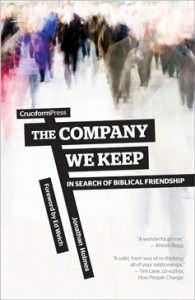Substitute Friendships?

September 15, 2014
 My CruciformPress book arrived in the mail this weekend, and it is a topic that has been on my mind lately: The Company We Keep: In Search of Biblical Friendship, by Jonathan Holmes. I had few free minutes last night, so I sat down and read the first 40 pages (this is an advantage of CruciformPress books, you can whiz through them). After listing some scenarios of different frustrations we encounter and ways we settle for superficial friendships, the author asks a really good question: “Should a Christian’s expectations for friendship differ from those of a non-Christian?” (17). He recognizes that many churches do not have a good friendship “climate.”
The first chapter teaches how we are created for community, and then gives three ways our sin interferes with biblical friendships. It’s a great chapter that points to our most important friend of all, Jesus Christ (John 15:13-15). It ends with a long, helpful definition of biblical friendship:
My CruciformPress book arrived in the mail this weekend, and it is a topic that has been on my mind lately: The Company We Keep: In Search of Biblical Friendship, by Jonathan Holmes. I had few free minutes last night, so I sat down and read the first 40 pages (this is an advantage of CruciformPress books, you can whiz through them). After listing some scenarios of different frustrations we encounter and ways we settle for superficial friendships, the author asks a really good question: “Should a Christian’s expectations for friendship differ from those of a non-Christian?” (17). He recognizes that many churches do not have a good friendship “climate.”
The first chapter teaches how we are created for community, and then gives three ways our sin interferes with biblical friendships. It’s a great chapter that points to our most important friend of all, Jesus Christ (John 15:13-15). It ends with a long, helpful definition of biblical friendship:
Biblical friendship exists when two or more people, bound together by a common faith in Jesus Christ, pursue him and his kingdom with intentionality and vulnerability. Rather than serving as an end in itself, biblical friendship serves primarily to bring glory to Christ, who brought us into friendship with the Father. It is indispensable to the work of the gospel in the earth, and an essential element of what God created us for. (27)This is a great definition which motivates me in my relationships. In Chapter Two, Holmes highlights “three substitutes we frequently take for the real thing: social media friendships, specialized friendships, and selfish friendships,” explaining that they “fall woefully short for God’s purposes for true friendship” (32). He offers some helpful categories here, but I found myself pushing back a bit. I only found the last one, selfish friendship, to be one that works against God’s purposes in friendship. Are these really substitutes? Aren’t there different types of friendship, that may not be equally valued, but certainly valid and even essential for a Christian in but not of the world? Let’s take a brief look at the three. Social Media Friendship: If you are reading my blog, you are probably involved enough on social media to have some cyber-friendships. Many may be physical friendships and acquaintances that you just don’t get to see very often, and therefore catch up with on Facebook and the like. There’s even a new word added to the dictionary for those we interact with online, but have never met in person: equaintance. I agree with the author’s warning that we should never be satisfied with social media friendships to the point that they replace or substitute having face-to-face biblical friendships. Social media friendships certainly should be distinguished in our discernment. But they may grow to the level of biblical friendship pretty nicely. I have had that experience. Specialized Friendship: These are the friendships that we have that focus around a shared activity or stage of life. College friends, workout friends, moms at the playground, and work friends are a few examples. Again, it is good to distinguish, but I see advantages in having these types of friendships. I wouldn’t want to settle for them to substitute for biblical friendships, but they may be stepping-stones to something deeper. And even if they don’t move past the specialized stage, I think it is good and even special to have some friends that share common interests. Stage of life friends are helpful for coping, and may last passed the stage they were meant for in surprising ways. I can think of several examples off the top of my head:
- My sister-in-law’s mom became friends with the woman she shared her delivery room with. They have gone through the baby stage, toddler stage, school-age, and now grandma stage together. Their friendship is still growing after 35 years.
- One of my college roommates is a non-Christian friend who pursues me to keep in touch even though we live a good distance apart. I am thankful that she does. We enjoy one another’s conversation.
- I think that one reason why we like to reconnect with high school friends on social media and see how they are doing is because those were such transformative years in our lives. I’ve recently reconnected with an old high school friend who is now a Christian. It was great to catch up.
- pursue the lost for friendship ideally leading to Christ,
- pursue fellow believers for friendship grounded in Christ” (42)




